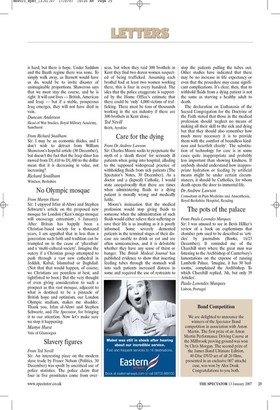Care for the dying
From Dr Andrew Lawson Sir: Charles Moore seeks to perpetuate the myth of a 'death threat' for seriously ill patients when going into hospital, alluding to the supposed widespread practice of withholding fluids from sick patients (The Spectator's Notes, 30 December). As a doctor and a (lapsed) Catholic, I would state unequivocally that there are times when administering fluids to a dying patient is morally wrong and medically futile.
Moore's insinuation that the medical profession would stop giving fluids to someone when the administration of such fluids would either relieve their suffering or save their life is as insulting as it is poorly informed. Some severely demented patients in the terminal stages of their disease are unable to drink or eat and are often semiconscious, and it is debatable whether they have any sense of thirst or hunger. The British Medical Journal has published evidence to show that inserting feeding tubes through the stomach wall into such patients increased distress in some and required the use of restraints to stop the patients pulling the tubes out. Other studies have indicated that there may be no increase in life expectancy or even that the procedure may cause significant complications. It's clear, then, that to withhold fluids from a dying patient is not the same as starving a healthy adult to death.
The declaration on Euthanasia of the Sacred Congregation for the Doctrine of the Faith stated that those in the medical profession should 'neglect no means of making all their skill to the sick and dying but that they should also remember how much more necessary it is to provide them with the comfort of boundless kindness and heartfelt charity'. The substitution of technology for care is in some cases quite inappropriate and probably less important than showing kindness. If anybody should understand how inappropriate hydration or feeding by artificial means might be under certain circumstances, it should be Catholics, for whom death opens the door to immortal life.
Dr Andrew Lawson Consultant in Pain Medicine and Anaesthesia, Royal Berkshire Hospital, Reading






















































 Previous page
Previous page